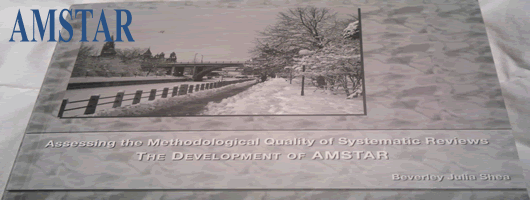Non Randomized studies (NRS)
Non Randomized Studies, also called observational studies have become controversial in the Systematic review world. Many hold strong to the view that results from these studies are unreliable and skewed. There are those who believe that Non Randomized Studies should not be completely written off and/or excluded from systematic reviews.
AMSTAR was initially developed to assess systematic reviews of RCTs. However, it is increasingly being used to assess those that include observational studies as well. Using the current AMSTAR on NRS could result in publication biases.
What classifies as a Non Randomized Study? The Cochrane Collaboration has a page that classifies such studies. Read more
Characteristics of Non Randomized Studies
- They have been known to yield comparison groups that are not similar in their characteristics bringing about differences in their outcomes as well. It may be believed that these differences are due to the intervention effects, however, this may not always be the case.
- NRS tend to report larger estimates of intervention effects than RCTs
- The GRADE approach assigns such studies a Grade C, RCTs being in Grade A. Read more from the Cochrane handbook.
- Several authors have highlighted the problems of bias and residual confounding and the separation of statistical and epidemiological inference that occurs when meta-analysis (data pooling) is used meta-analyses of observational data produce very precise but spurious results(Egger et al)

- publication bias, selective outcome reporting, and selective analysis reporting are greater with NRS than with RCTs
The Cochrane Collaboration has a methods group geared specifically to the inclusion of NRS, The Non Randomized Studies Methods Group (NRSMG). View their activities
Cochrane has also published a chapter on NRS based on supporting authors who are considering including Non Randomized Studies in their reviews. 
|
